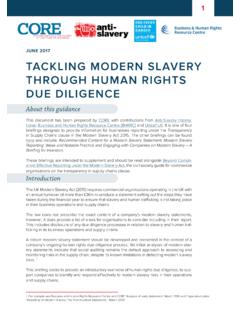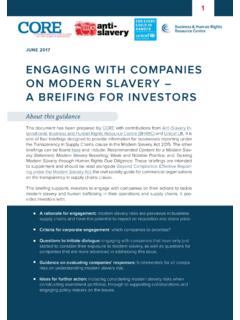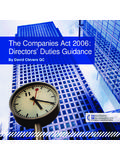Transcription of BEYOND COMPLIANCE: EFFECTIVE REPORTING …
1 BEYOND compliance : EFFECTIVE REPORTING UNDER THE modern slavery ACT A civil society guide for commercial organisations on the transparency in supply chains clauseContentsAbout this guidance 3 Introduction 4 1. Why should businesses be concerned with modern slavery ? 5 2. Summary of recommended priority actions 7 3. Understanding the risks 9 4. Addressing the risks 12 a.
2 Policy development b. Human rights due diligence c. External and internal consultation d. Procedures for REPORTING suspected and identified slavery and forced labour 5. The slavery and Human Trafficking Statement 20 a. Structure of the statement b. Sign-off and publication c. Update and review 6. Further information 26 2 About this guideThis document has been prepared by CORE, with contributions from Amnesty International UK, Anti- slavery International, CAFOD, Focus on Labour Exploitation (FLEX), Know the Chain, Quakers in Britain, ShareAction,Traidcraft and Unicef UK, and is supported by Dalit Freedom Network UK, ECPAT UK, Walk Free and Unseen. The guidance is intended to share initial thinking around how the provisions on transparency in supply chains in the modern slavery Act 2015 can be used to drive positive change and help prevent slavery and forced labour from occurring.
3 It aims to complement the statutory Home Office guidance will evolve over time and as companies report under the Act, it will be updated to reflect leading practice. We welcome feedback and responses from businesses and others on this guidance; please contact us using the form at published February CoalitionThe FoundryOval WayLondon SE11 presence of slavery and forced labour in the operations and supply chains of many businesses internationally and in the UK is a grave problem. As NGOs, we campaigned for the modern slavery Act 2015 to require businesses to report on what they are doing to address slavery because we believe that a minimum standard established in law provides clarity to business and prevents good practice from being undermined by less responsible companies. Section 54 of the Act, Transparency in Supply Chains (TISC) requires every organisation carrying on a business in the UK with a total annual turnover of 36m or more to produce a slavery and human trafficking statement for each financial year of the organisation.
4 Organisations are required to publish this statement on their website and must include a link to the statement in a prominent place on the website s her Foreword to the Home Office s practical guide on the supply chain REPORTING requirement, the Home Secretary Theresa May leaves no room for doubt about the obligation on commercial organisations to address the issue: It is not acceptable for any organisation to say, in the twenty-first century, that they did not know. It is not acceptable for organisations to ignore the issue because it is difficult or complex. And, it is certainly not acceptable for an organisation to put profit above the welfare and well-being of its employees and those working on its behalf. 2To meet this responsibility, companies must have an honest and transparent view of their supply chains and recognise that commitment, relationships, and open communication with all actors are essential.
5 All companies should aim to work jointly with civil society and other stakeholders, including employees, suppliers and investors, to address risks. Businesses can come together with a positive agenda to develop and establish shared expectations, standards and number of businesswomen and men have asked us what civil society recommends in relation to the TISC clause. This guidance provides ideas for how companies can respond effectively and link actions to address slavery to broader thinking about human rights due diligence. We see the new requirement as an opportunity for immediate action by individual companies, as well as for the development of collective approaches within sectors to prevent slavery occurring in supply chains. It is important that all businesses consider whether they may be contributing to such abuses and take appropriate some organisations the REPORTING requirement will be a challenge, but hiding the problem of slavery will do nothing to change the status quo.
6 We believe that where risks do exist, consumers would prefer companies to be open about what they have found and set out what they are doing to end slavery . While the legislative requirement is to report - and the law allows considerable freedom regarding the contents of the statement - we would like to see companies seize the opportunity to show leadership by assessing the impacts and risks of their business model and taking appropriate action, rather than following a compliance only approach. Listed companies that are already required to report on human rights issues under the Companies Act should seek to develop their response to TISC in the context of their human rights due diligence as a whole. We would also encourage companies to work within sectors to identify best practice and ways to tackle the problem. The TISC clause has been described as a potential game changer on supply chains.
7 EFFECTIVE action now can begin to make this a reality. 1. Why should businesses be concerned with modern slavery ? modern slavery should be understood as an overarching term encompassing all forms of contemporary slavery : human trafficking, slavery , servitude, forced and bonded labour and the worst forms of child labour. It is a grave violation of human rights that affects people almost everywhere, including in the UK. While there is no exact data on the prevalence of forced labour and trafficking, the International Labour Organisation (ILO) estimates that there are 21 million people in forced labour across the would be shocked that our decisions could in any way be contributing to slavery , yet the nature of business today can create conditions where slavery and forced labour flourish. Organisations can be implicated in modern slavery both directly and indirectly in a variety of ways: in their own operations, through their global supply chains and through their involvement with business partners.
8 Companies also risk employing exploited workers in the construction, maintenance and servicing of their facilities, particularly in cases where those functions are outsourced to third-party suppliers. Companies can be implicated less directly if their products or services are used by traffickers. This may occur, for example, in the tourism, transport and hospitality slavery is a truly global problem, and while some countries and industries face particular challenges, all are affected. Assuming that one country or industry is better than another hinders an EFFECTIVE response in company supply chains and employers and providers of goods and services, businesses have a pivotal role to play in the fight against human trafficking, forced labour and slavery . Companies and employers are particularly well placed to prevent and detect exploitation in their own operations and in the communities where they operate, to influence and work together with suppliers and business partners, and to raise labour standards within their industries.
9 Some companies, in some sectors, are also in a position to spot and report an issue which by its nature tends to remain hidden. The moral case is compelling and is driving businesswomen and men to take A company with strong policies that can show it is taking EFFECTIVE action to combat slavery will be more attractive to new clients, investors, and business trafficking, slavery and forced labour are punishable as criminal offences in most countries in the world, and companies found to be involved in these offences could face prosecution, administrative actions and civil Allegations of modern slavery could also constitute a serious risk to a business s brand value and reputation. EFFECTIVE actions can enhance corporate reputation and image, and taking an active role now will bring benefits to companies, including: Improved risk assessment and management: mapping and managing supply chains will enhance overall risk management.
10 For instance, in the food production and processing industry, improved supply chain control will contribute to minimising risks associated with food safety. Investor relations: both because of the risk to a company s reputation and to its bottom line through consumer, operational and litigation risks, public companies will be under pressure from investors to show that this is an issue they are taking seriously, working to address and REPORTING on accurately. A company with strong policies that can show it is taking EFFECTIVE action to combat slavery will be more attractive to new clients, investors, and business partners. Consumer relations: increased awareness of the reality of modern slavery has led to goods and services linked to labour abuses being rejected by consumers, procurement professionals and industry buyers. Consumers are becoming increasingly engaged in activism on this issue and, as a result, companies are facing mounting pressure from governments and consumers to ensure their supply chains are free from exploitation.




